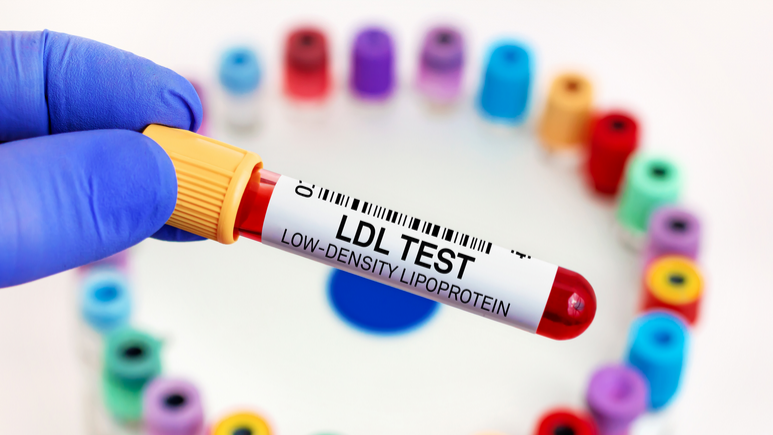
A study published in April examined the association between Apolipoprotein B (ApoB), LDL cholesterol levels, and plaque buildup for individuals on a ketogenic diet. The study found that high ApoB and/or LDL cholesterol levels were not reliable predictors of plaque buildup for “lean mass hyper responders” (LMHR) who were eating a ketogenic diet.
The trial included 100 participants and tracked them for one year. The results showed plaque buildup for individuals who already had calcified plaque at the start of the study. The authors wrote, “Changes in and baseline levels of ApoB were not associated with changes in noncalcified plaque volume or total plaque score as measured by CCTA. However, baseline CAC and other plaque metrics were positively associated with increases in coronary plaque, supporting the notion that plaque begets plaque but ApoB does not, in this population.”
The ketogenic diet is a diet that includes high fat intake, including from animal-food sources, including meat, eggs, and milk. The carnivore diet is a type of keto diet that several individuals have promoted despite the claims that this diet raises cholesterol and increases the risk of heart disease. This latest study adds more data to the discussion about the “cholesterol myth.”
The American Heart Association states, “Eating too much saturated fat can raise the level of LDL(bad) cholesterol in your blood. A high level of LDL cholesterol in your blood increases your risk of heart disease and stroke.” The AHA recommends people limit their daily intake of saturated fats to 6% of calories per day or approximately 120 calories on a 2,000-calorie diet. Sources of saturated fat include meat (except fish), dairy, beef tallow, coconut oil, and palm oil.
The AHA also recommends statin medications for individuals with high LDL cholesterol. Tracy Beanz and Michelle Edwards reported for The HighWire last year about the ineffectiveness and harms of statins in addition to the belief that high cholesterol is a driver for heart disease, which is the leading cause of death.
Beanz and Edwards wrote about a study published in 2024 that shows Oreo cookies are twice as effective as statins at lowering LDL cholesterol. Currently, 92 million people take statin drugs, approximately 35% of the American adult population.
A 2017 study published in The Lancet found that higher levels of fat consumption, including saturated fat, reduce mortality risk. The study also found that high carbohydrate consumption is associated with higher mortality risk, but not specifically for cardiovascular disease. The authors wrote, “Total fat and saturated and unsaturated fats were not significantly associated with risk of myocardial infarction or cardiovascular disease mortality.”
Dr. Zoe Harcombe, author of the book “The Harcombe Diet: Stop Counting Calories and Start Losing Weight, said “How on earth [have] we ever got away with telling people cholesterol causes heart disease?” She pointed out that reputable research reveals that high cholesterol is associated with lower heart disease and vice versa—for all the available data in the world! “
A 2014 meta-analysis published in the Annals of Internal Medicine examined the association between fatty acids and coronary disease. The authors concluded, “Current evidence does not clearly support cardiovascular guidelines that encourage high consumption of polyunsaturated fatty acids and low consumption of total saturated fats..”
The AHA continues to promote polyunsaturated fatty acids, including corn, soybean, canola, and sunflower oil. These are also classified as seed oils, which has been one issue of contention when discussing healthy dietary choices. Restaurants like Steak N’ Shake have committed to using beef tallow instead of seed oils for french fries, which has been one of the recommendations by Health and Human Services Secretary Robert F. Kennedy Jr.
Meanwhile, the statin industry is expected to reach $32 billion by the year 2032 despite studies linking the drugs to memory loss and diabetes.
Dr. Aseem Malhotra has been an advocate for lifestyle change rather than statins for preventing heart disease. He also says the focus on lowering cholesterol has not been helpful in the goal of reducing deaths from heart disease.
Dr. Malhotra said, “Lowering cholesterol needs to be relegated to division four of the league of tackling heart disease, because for 99 percent of the population, total levels of cholesterol, and so-called ‘bad’ LDL cholesterol, has almost no value at all in predicting whether or not someone is going to have a heart attack – therefore we should stop obsessing about lowering it.”
Dr. Malhotra recommends avoiding ultra-processed foods, as well as low-quality carbs like white bread, pasta, rice, and potatoes. He also recommended 30 minutes of moderate exercise, five times a week.
“It’s a brisk walk every day, which is something everyone can do,” Dr. Malhotra said. “Reducing stress and getting a good seven hours sleep a night is important too. Combine all that, and this heart disease pandemic would be eliminated within a few years.”








